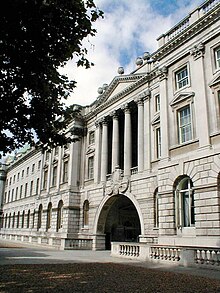College
College (read /ˈkɒlɪdʒ/ in English) is the term used to describe an educational institution, but its meaning varies in English-speaking countries; as well as in French the variety of educational institutions referred to as collège (with a grave accent; read /kɔ.lɛʒ/). The word is also generally used as a synonym for university in the United States. Colleges in countries such as France, Belgium and Switzerland provide secondary education.
Higher education
Within higher education, the term can be used to refer to:
- A constituent part of a college, such as King's College, Cambridge, or a federal university, for example King's College London.
- A university of liberal arts, an independent institution of higher education focused on university education, such as Williams College or Amherst College.
- A division of liberal arts from a university whose undergraduate program does not follow a model of liberal arts, such as Yuanpei College at Beijing University.
- An institute that provides specialized training, such as a college of higher education, for example, the Metropolitan College of Belfast, a faculty of teacher training or an art faculty.
- In the United States, the university is sometimes, but seldom, a synonym for a research university, such as Dartmouth College, one of the eight Ivy League universities.
United Kingdom
The use of the word college in the UK is very broad and includes a wide variety of institutions:
- Some private schools such as Eton, Winchester or St Aloysius' College, Glasgow.
- Some high school.
- The faculties of some universities or former colleges and major colleges.
- Other types of education institutions outside the traditional system, ranging from some very old and distinguished as the Royal College of Organists, to new attempts at adult education structures. This includes university colleges, which are higher education institutions that can issue university diplomas without having the university classification.
Universities and their faculties
Oxford and Cambridge
The two ancient universities of England (Oxford and Cambridge, sometimes collectively called Oxbridge), are generally federations of autonomous faculties or colleges. They have a similar operation to the old residence halls. They provide accommodation, food, libraries, sports and social activities, they also appoint tutors in charge of monitoring the performance of the students. On the other hand, the university provides the classes, conducts the exams and awards the degrees. The colleges are totally independent entities, owners of their properties, with their own staff and their own budget. In some cases colleges may have better financial conditions than the universities with which they are associated.
Other universities
Durham University is also organized into colleges, and these too have their own legal identity. However, Durham colleges are not financially independent and offer only student services, no teaching. Recent universities, such as Lancaster, York and Kent, have a similar structure, except that their colleges have no identity of their own. Officially, the University of London is made up of a series of colleges, however, the federation is much more flexible than in Oxford or Cambridge, to the point that these institutions can be considered as independent universities.
United States
In the United States the term college has a more restricted use than in the United Kingdom and is generally reserved for higher education institutions that can offer degrees, both undergraduate and postgraduate. In practice, there is no difference between the name university or college, although originally a college was a college and a university was an institution with several colleges. Today, universities include colleges and schools, but some of the most prestigious universities in the United States, such as Boston, Harvard or Dartmouth, they have kept the word college in their names for historical reasons even though they have several faculties and award degrees in a wide variety of areas and levels.
A variant of these institutions are university colleges, called community colleges, junior colleges, technical colleges, or city colleges . These are centers that only offer two-year programs, that is, they only grant associate's degrees or their own degrees.
Australia
In Australia, a college may be used to refer to an institute of higher learning smaller than a university, which may be administered by a university or be independently run. Due to a reform carried out in the 1980s, many of the previously independent colleges became part of larger universities. Many secondary schools are also called colleges in Australia. The term is also used when referring to student residences, as in the United Kingdom, but when comparing their tutoring programs, Australian institutions are smaller and do not carry out teaching activities leading to an academic degree, exception of one or two theological teaching institutions.
Canada
In Canada, a college is a technical, applied arts or applied sciences school — an institution that grants higher education diplomas, which is not necessarily a university, although there are exceptions. In Quebec, it can particularly refer to CEGEP, a form of higher education that is part of the Quebec educational system.
France
A collège (in French, with a grave accent; read /kɔ.lɛʒ/) is a lower secondary school. It consists of four courses that are usually attended from eleven to fifteen years of age. The second cycle of secondary education is taken at a lycée.
In some cases, it is a research body:
- Collège de France
- Collège international de philosophie.
In a very special case, an ironic use of the concept has been made:
- Collège de 'Pataphysique.
Spanish-speaking countries
Peru and Chile
In Peru and Chile some schools include the term college as a way of identifying themselves as bilingual (Markham College and Casuarinas College in Peru; Saint George's College, Santiago College and some British schools in Chile).
Since 2009, the Pontificia Universidad Católica de Chile has used it to name an undergraduate degree that, following the model of some English-speaking universities, combines majors and minors.
Contenido relacionado
Yuelu Academy
Template:Where to start/doc
Autonomous University of Baja California


